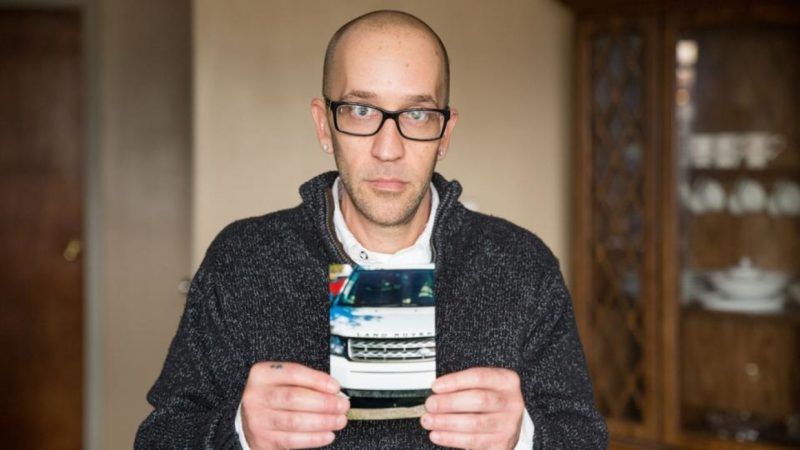Indiana Argues That the State Should Be Able To Take Everything You Own if You Commit a Drug Crime
The state used civil asset forfeiture to seize Tyson Timbs' car in 2013. His nightmare hasn't ended.

In 2013, Tyson Timbs sold drugs to an undercover cop. Suffering from a history of addiction, he relapsed after the death of his father the previous year.
In 2021, the state of Indiana is arguing why it should have the right to steal his car, and the assets of those like him.
The two may seem entirely unrelated. That is because, in many ways, they are. Timbs purchased a $42,000 Land Rover in January 2013 with his father's life insurance payout; the transaction was divorced from any drug offense. But under a practice called civil asset forfeiture, states are permitted to seize property if someone is merely suspected of committing a crime, often even without an indictment. In Indiana, prosecutors may proceed simply with a preponderance of evidence.
Appearing before the Indiana Supreme Court yesterday, the state argued that it was plainly constitutional when they robbed Timbs of his Land Rover nearly eight years ago—the third time they have made such an argument before the state's high court over the last four years.
In May 2020, Timbs reclaimed the car, but only after a legal saga that saw his case ping-pong up and down the rungs of the U.S. court system. Indiana's high court rejected Timbs' initial plea, noting that the U.S. Supreme Court had not yet ruled on whether the Eighth Amendment—which protects against excessive fines and fees—applies to states.
In February 2019, SCOTUS said it does. The Indiana Supreme Court then created guidance on what qualifies as "excessive," but instead of deciding on Timbs' case specifically, they passed the buck to a lower court with the new rules in hand.
A trial court ruled in his favor in April 2020, writing that seizing the vehicle—which was worth four times the value of the maximum financial penalty for the crime Timbs committed—was indeed "excessive."
Indiana was unfazed. "The state is once again asking the Indiana Supreme Court to hold that there is no proportionality limit on how much property they can forfeit, that they can forfeit a Bugatti if it goes five miles over the speed limit, regardless of what an obvious mismatch and injustice that would be," says Sam Gedge, an attorney at the Institute for Justice, the legal nonprofit representing Timbs.
Their alternative argument isn't much better. The state maintains that, even if proportionality is on the table, "when it comes to punishing anybody who struggled with drug addiction, no punishment is too high," Gedge explains. "So [the state] can basically take everything they own, and that shouldn't violate the excessive fines clause."
States generally defend that line of thinking under the guise that asset forfeiture helps fracture criminal enterprises. Reality paints a different picture. Police often pocket the proceeds in department slush funds—a lucrative game, when considering that state and local governments have leveraged the law to steal more than $68 billion from people in their communities since the year 2000.
More fraught is that such recourse does not have an impact on crime. But it can prevent people from successfully reintegrating into society after a stint in the criminal justice system. That was not lost on the Indiana trial judge who ruled in Timbs' favor last April, describing the car as "a tool essential to maintaining employment, obtaining treatment, and reducing the likelihood that he would ever again commit another criminal offense."
Timbs did his time, serving one year on house arrest and five years on probation. Both have long passed. It appears the state, however, would like to punish him forever.


Show Comments (64)